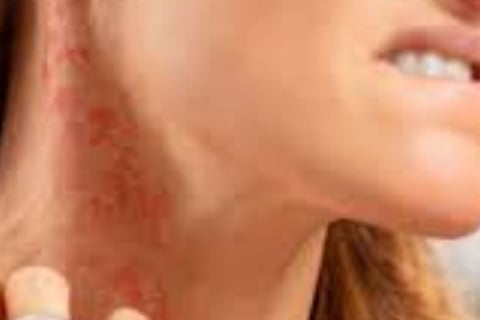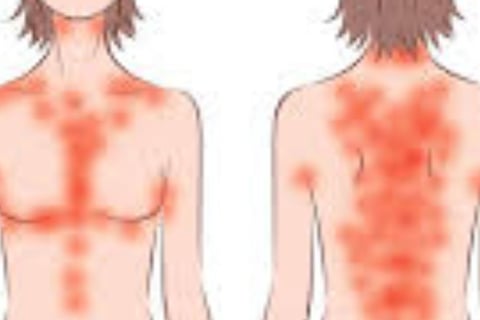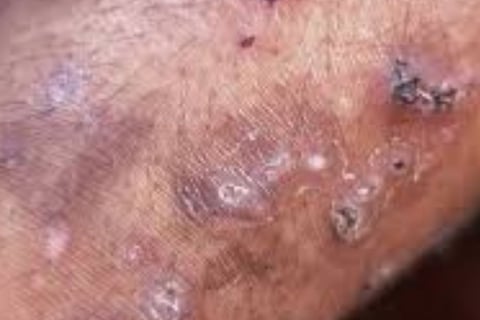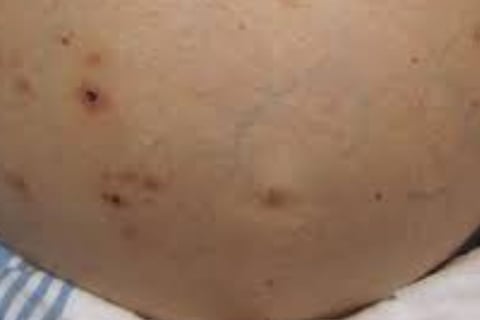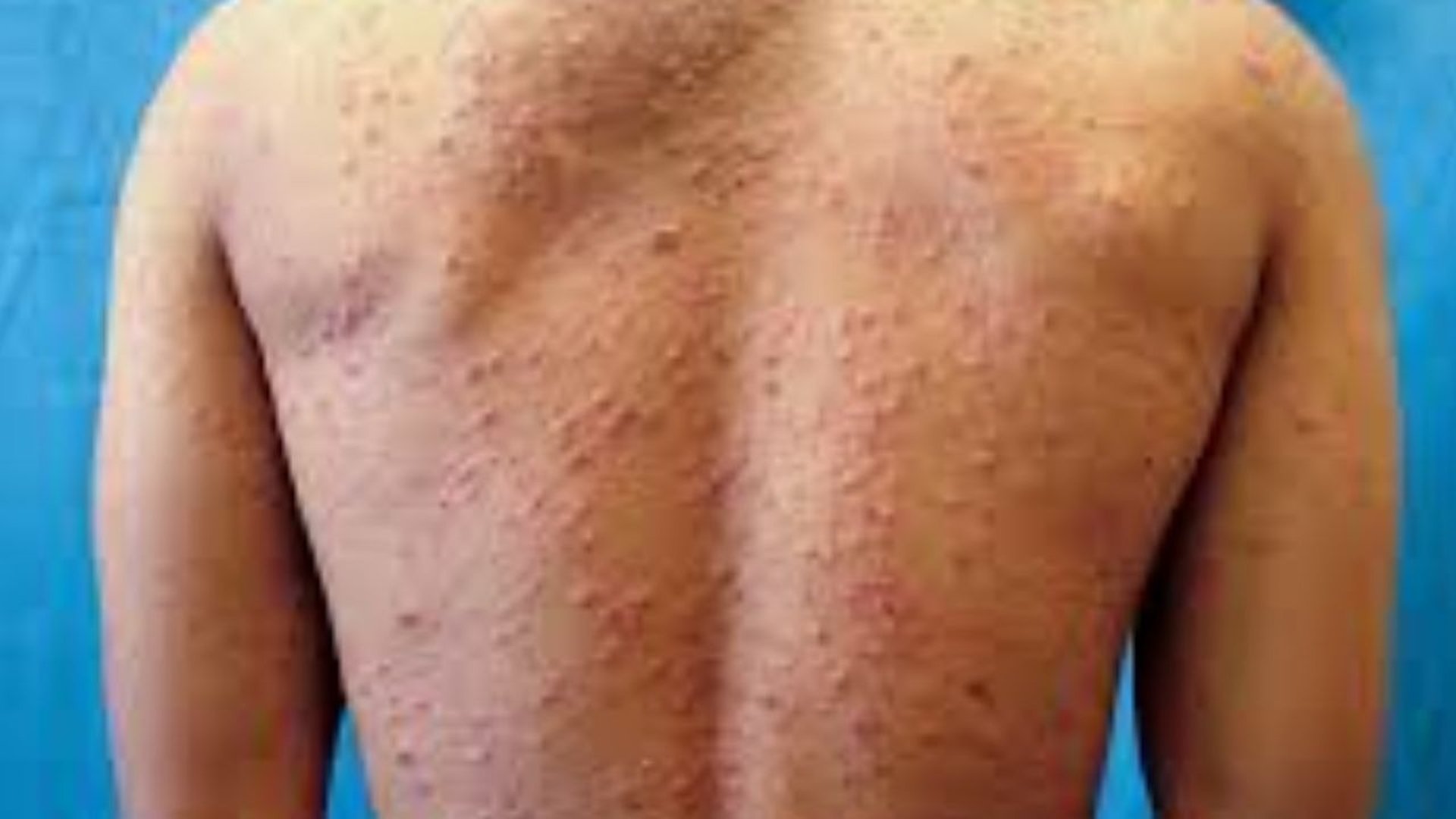
Fasting Benefits for Skin Allergies & Itching
Discover how fasting can alleviate skin allergies and itching, including effective eczema treatments. Learn about foods that cause allergies and the benefits of fasting for skin health, pruritus, and autoimmune diseases.
GENERAL
Dr Hassan Al Warraqi
4/19/202512 min read


Fasting For Skin Allergies Itching & Pruritus
Fasting can offer several benefits for skin health, particularly in reducing itching and rashes associated with skin allergies.
how long to fast for skin problems and allergies
Below are the key benefits fasting may provide for managing skin allergies:
Improved Immune System Function
Fasting can enhance immune system performance, potentially reducing overactive immune responses that trigger allergies. A more balanced immune system may lead to fewer reactions to allergens, minimizing skin sensitivity and irritation.
Reduced Inflammation
Research suggests fasting can lower inflammation in the body, a primary cause of skin issues like rashes and itching. By decreasing systemic inflammation, fasting may help alleviate symptoms of conditions such as eczema or urticaria.
Rest for the Digestive System
Fasting gives the digestive system a break, allowing it to rest and heal. Since digestive issues can contribute to skin problems, this rest period may positively impact skin health, reducing allergy-related flare-ups.
Enhanced Cellular Function
Fasting can stimulate cellular regeneration and repair processes, promoting healthier skin. This may aid in healing skin damage caused by allergic reactions, improving overall skin resilience.
Detoxification of the Body
Fasting may support the body’s natural detoxification processes, helping to eliminate toxins that can contribute to skin irritation.how long to water fast for skin problems and allergiesA cleaner system can lead to reduced skin sensitivity and a clearer complexion.
SEO Tip: Incorporate fasting into your routine to potentially improve skin conditions like eczema, hives, or chronic itching, but ensure proper nutrition during non-fasting hours to avoid deficiencies.
Note: Always consult a healthcare professional before fasting, especially if you have underlying health conditions or are managing chronic skin allergies. Proper hydration and balanced meals during non-fasting periods are crucial to maximize benefits and prevent complications.
Diseases That May Benefit from Fasting with Specific Examples
Fasting, including intermittent fasting or religious fasting like Ramadan, may provide health benefits for various conditions, particularly those related to inflammation, autoimmune disorders, or metabolic issues. Below are examples of diseases that may benefit from fasting, along with their potential benefits based on research and studies:
Skin Conditions (e.g., Eczema and Urticaria)
Benefit: Fasting reduces the intake of trigger foods, alleviating rashes and itching. It also decreases systemic inflammation and promotes detoxification, improving skin health.
Mechanism: Enhances immune system balance, reducing overactive immune responses that cause skin inflammation.
Example: Individuals with eczema may notice symptom improvement when avoiding allergenic foods during fasting.
Type 2 Diabetes
Benefit: Intermittent fasting improves insulin sensitivity, lowers blood sugar levels, and aids in weight management.
Mechanism: Reducing calorie intake enhances metabolic processes and decreases insulin resistance.
Example: Type 2 diabetes patients practicing intermittent fasting (e.g., 16:8 method) may achieve better glucose control.
Cardiovascular Diseases
Benefit: Fasting lowers blood pressure, bad cholesterol (LDL), and triglycerides, reducing the risk of heart disease.
Mechanism: Improves lipid metabolism and reduces inflammation affecting blood vessels.
Example: Individuals at risk of atherosclerosis may benefit from regular fasting to improve heart health.
Autoimmune Diseases (e.g., Rheumatoid Arthritis)
Benefit: Fasting reduces inflammation and balances immune responses, alleviating symptoms of autoimmune conditions.
Mechanism: Decreases production of pro-inflammatory cytokines and stimulates cellular regeneration.
Example: Rheumatoid arthritis patients may experience reduced joint pain and stiffness during fasting.
Digestive Disorders (e.g., Irritable Bowel Syndrome)
Benefit: Fasting gives the digestive system a rest, reducing inflammation and improving gut health.
Mechanism: Resting the gut minimizes food sensitivities and promotes a balanced gut microbiome.
Example: People with IBS may notice reduced bloating and cramping during fasting periods.
Obesity
Benefit: Fasting aids in weight loss by improving metabolism and promoting fat burning.
Mechanism: Calorie restriction and activation of autophagy (cellular cleanup) support weight management.
Example: Obese individuals may achieve sustainable weight loss with intermittent fasting.
Neurological Disorders (e.g., Epilepsy)
Benefit: Fasting may reduce seizure frequency by stabilizing neuronal activity.
Mechanism: Ketone production during fasting provides an alternative energy source for the brain, reducing abnormal electrical activity.
Example: Some epilepsy patients following a ketogenic diet combined with fasting report fewer seizures.
Important Notes:
Medical Consultation: Fasting may not be suitable for everyone, especially those with conditions like type 1 diabetes or advanced kidney failure. Consult a doctor before starting.
Nutritional Balance: Focus on nutrient-rich meals during non-fasting periods to avoid deficiencies.
Hydration: Drinking sufficient water during non-fasting hours is essential to support health benefits.
SEO Tip: Use keywords like “fasting benefits for eczema,” “fasting and diabetes,” “fasting for IBS,” and include links to related health and nutrition articles to boost engagement.
Frequently Asked Questions (FAQs) About Skin Allergies, Itching, Pruritus
Benefits of Fasting
1. What are the main foods that may trigger skin allergies and worsen their symptoms?
Foods that can exacerbate skin allergies include:
Tomatoes (especially for those sensitive to Peru balsam).
Citrus fruits like oranges and lemons.
Spices such as cinnamon, cloves, coriander, fenugreek, garlic, and vanilla.
Soy products (soybeans, tofu, soy sauce, edamame).
Peanuts (can cause severe allergic reactions).
Shellfish (due to tropomyosin protein).
Sugary foods, processed foods, dairy products, eggs, and sesame.
SEO Tip: Avoid these foods to manage eczema or hives and reduce skin irritation.
2. What are the key tips for people with skin allergies to control the condition?
To manage skin allergies, follow these tips:
Avoid triggers: Such as allergenic foods, dust, and pollen.
Regular moisturizing: Use a suitable moisturizer to keep skin hydrated.
Use oatmeal: It helps soothe the skin and relieve itching.
Careful bathing: Shorten shower time, use lukewarm water, and avoid harsh or fragranced cleansers.
Gentle skin handling: Pat skin dry and test new products on a small area first.
SEO Tip: A proper skincare routine can significantly reduce symptoms of eczema and chronic itching.
3. How does fasting affect skin allergies or itching, and can it be beneficial?
Fasting may benefit conditions like urticaria and chronic itching by:
Reducing intake of trigger foods.
Promoting detoxification and skin repair.
Alleviating symptoms of eczema and certain skin inflammations.
Note: Ensure nutritional balance during iftar and suhoor to avoid deficiencies.
SEO Tip: Fasting during Ramadan can improve skin health with proper dietary planning.
4. What are the common causes of itching (Pruritus)?
Causes include:
Skin conditions: Eczema, psoriasis, dry skin, rashes.
Internal diseases: Liver or kidney disease, thyroid disorders, cancer.
Environmental factors: Exposure to chemicals, weather changes, food or drug allergies, pregnancy.
Psychological stress: Can worsen itching.
SEO Tip: Identifying the cause of itching is key to finding the right treatment.
5. Is itching linked to fasting during Ramadan?
Yes, itching during Ramadan may be caused by:
Dehydration: Lack of fluids can worsen dry skin.
Gallbladder issues: Can intensify itching when combined with dehydration.
Food allergies: Consuming specific foods during iftar or suhoor.
SEO Tip: Staying hydrated during Ramadan can help reduce dehydration-related itching.
6. When should someone with itching see a doctor?
Consult a doctor if:
Itching is severe or persistent.
It disrupts daily life or sleep.
It causes skin damage due to scratching.
It’s accompanied by other symptoms or doesn’t respond to home remedies.
SEO Tip: Seeing a dermatologist is crucial for diagnosing and treating persistent itching.
7. What treatments are available to relieve skin itching?
Treatments include:
Moisturizers: To combat dryness.
Topical corticosteroids and antihistamines to reduce inflammation and itching.
Oral anti-allergy medications.
Phototherapy: For chronic cases.
Treating underlying internal conditions and avoiding triggers.
SEO Tip: Natural moisturizers like shea butter can soothe sensitive skin.
8. Can itching be a symptom of kidney failure, and what are its characteristics?
Yes, uremic pruritus is a common symptom of advanced kidney failure, characterized by:
Daily episodes, worsening at night.
May be generalized or localized to areas like the back, abdomen, head, or arms.
Accompanied by dry skin, stretch marks, or sores.
SEO Tip: Itching linked to kidney failure requires urgent medical attention.
Frequently Asked Questions (FAQs) About Diseases That May Benefit from Fasting
1. What diseases can potentially benefit from fasting?
Fasting, such as intermittent fasting or religious fasting (e.g., Ramadan), may benefit conditions including:
Skin conditions (e.g., eczema, urticaria)
Type 2 diabetes
Cardiovascular diseases
Autoimmune diseases (e.g., rheumatoid arthritis)
Digestive disorders (e.g., irritable bowel syndrome)
Obesity
Neurological disorders (e.g., epilepsy)
SEO Tip: Fasting can support management of chronic conditions when done under medical supervision.
2. How does fasting help with skin conditions like eczema or urticaria?
Fasting reduces intake of allergenic foods, decreases systemic inflammation, and promotes detoxification, which can alleviate itching and rashes. It also balances immune responses, reducing flare-ups.
Example: Eczema patients may experience fewer symptoms by avoiding trigger foods during fasting.
SEO Tip: Search for “fasting for eczema relief” to learn how dietary changes can improve skin health.
3. Can fasting benefit type 2 diabetes?
Yes, fasting improves insulin sensitivity, lowers blood sugar levels, and supports weight loss, aiding in diabetes management.
Mechanism: Reduced calorie intake enhances metabolic health and decreases insulin resistance.
Example: Intermittent fasting (e.g., 16:8 method) can help type 2 diabetes patients control glucose levels.
SEO Tip: Explore “intermittent fasting for diabetes” for tips on safe fasting practices.
4. How does fasting support cardiovascular health?
Fasting lowers blood pressure, bad cholesterol (LDL), and triglycerides, reducing the risk of heart disease.
Mechanism: It improves lipid metabolism and reduces vascular inflammation.
Example: Regular fasting may benefit those at risk of atherosclerosis by improving heart health.
SEO Tip: Look up “fasting for heart health” to discover its cardiovascular benefits.
5. Can fasting help with autoimmune diseases like rheumatoid arthritis?
Yes, fasting reduces inflammation and balances immune responses, potentially easing autoimmune symptoms.
Mechanism: It decreases pro-inflammatory cytokines and promotes cellular repair.
Example: Rheumatoid arthritis patients may notice reduced joint pain during fasting.
SEO Tip: Search “fasting for autoimmune diseases” for insights on managing symptoms.
6. How does fasting benefit digestive disorders like irritable bowel syndrome (IBS)?
Fasting allows the digestive system to rest, reducing gut inflammation and improving microbiome balance.
Mechanism: Resting the gut minimizes food sensitivities and supports digestive health.
Example: IBS patients may experience less bloating and cramping during fasting.
SEO Tip: Check “fasting for IBS relief” for strategies to ease digestive discomfort.
7. Is fasting effective for obesity?
Yes, fasting promotes weight loss by enhancing metabolism and encouraging fat burning.
Mechanism: Calorie restriction and autophagy (cellular cleanup) support weight management.
Example: Obese individuals practicing intermittent fasting may achieve sustainable weight loss.
SEO Tip: Explore “fasting for weight loss” for effective fasting plans.
8. Can fasting help with neurological disorders like epilepsy?
Yes, fasting may reduce seizure frequency by stabilizing brain activity.
Mechanism: Ketone production during fasting provides an alternative energy source for the brain, reducing abnormal electrical activity.
Example: Some epilepsy patients combining fasting with a ketogenic diet report fewer seizures.
SEO Tip: Search “fasting for epilepsy” to learn about its neurological benefits.
9. Is fasting safe for everyone with these conditions?
Fasting may not be suitable for all, especially those with conditions like type 1 diabetes, advanced kidney failure, or certain other chronic illnesses. Always consult a healthcare provider before starting.
SEO Tip: Safety is key—search “safe fasting for chronic diseases” for guidance.
10. What precautions should be taken during fasting to maximize benefits?
Medical supervision: Consult a doctor, especially for chronic conditions.
Nutritional balance: Consume nutrient-rich meals during non-fasting periods to avoid deficiencies.
Hydration: Drink plenty of water during non-fasting hours to support health.
SEO Tip: Look up “healthy fasting tips” to ensure safe and effective fasting practices.
Final Note: Fasting can offer significant benefits for various diseases, but it must be approached cautiously and under medical guidance to ensure safety and effectiveness.
FAQs on Pruritus Ani, Vulvar Diseases, and the Potential Benefits of Fasting
1. What is pruritus ani, and how does it relate to vulvar diseases?
Pruritus Ani: This is chronic itching of the perianal skin, often caused by irritants (e.g., soaps, fecal residue), infections (e.g., Candida), dermatological conditions (e.g., eczema, psoriasis), or systemic diseases (e.g., diabetes, liver disease). It affects 1-5% of adults, more commonly men.
Vulvar Diseases: These include inflammatory conditions (e.g., lichen sclerosus, lichen planus), infections (e.g., candidiasis, herpes), or
pre-cancerous/cancerous conditions (e.g., vulvar intraepithelial neoplasia, vulvar cancer). Many cause pruritus vulvae (vulvar itching).
Connection: Both pruritus ani and vulvar diseases can share causes like infections, allergies, or autoimmune disorders.
For example, Candida or contact dermatitis can affect both the anus and vulva, leading to overlapping symptoms
like intense itching. Fasting may help manage these by reducing inflammation and trigger exposure.
SEO Tip: Search “pruritus ani and vulvar itching causes” to understand shared triggers and treatments.
2. How can fasting benefit pruritus ani?
Fasting may alleviate pruritus ani by:
Reducing Inflammation: Fasting lowers systemic inflammation, which can reduce skin irritation in the perianal area.
Limiting Dietary Triggers: Avoiding foods like spicy dishes, citrus, or caffeine during fasting may reduce fecal irritants that worsen itching.
Improving Gut Health: Fasting rests the digestive system, potentially reducing issues like diarrhea or fecal leakage that irritate the perianal skin.
Example: Patients with pruritus ani linked to food sensitivities may notice less itching during fasting due to reduced exposure to triggers.
SEO Tip: Look up “fasting for pruritus ani relief” for dietary strategies to manage anal itching.
3. Can fasting help with vulvar diseases causing itching?
Yes, fasting may benefit vulvar diseases, particularly those with inflammatory or allergic components, such as:
Lichen Sclerosus: Fasting reduces inflammation, potentially easing itching and preventing flare-ups.
Vulvar Dermatitis/Eczema: By limiting exposure to dietary allergens, fasting may reduce symptoms like pruritus vulvae.
Candidiasis: Fasting may improve immune balance, reducing overgrowth of Candida, a common cause of vulvar itching.
Mechanism: Fasting enhances immune regulation, reduces pro-inflammatory cytokines, and promotes detoxification, all of which can soothe vulvar irritation.
Example: Women with vulvar eczema may experience less itching during fasting by avoiding trigger foods like dairy or soy.
SEO Tip: Search “fasting for vulvar itching” to explore its benefits for inflammatory vulvar conditions.
4. Which vulvar diseases might benefit most from fasting?
Vulvar diseases most likely to benefit from fasting include:
Lichen Sclerosus: Fasting’s anti-inflammatory effects may reduce itching and slow disease progression.
Lichen Simplex Chronicus: Fasting can break the itch-scratch cycle by reducing inflammation and trigger exposure.
Vulvar Psoriasis: Fasting may alleviate symptoms by modulating immune responses and reducing systemic inflammation.
Vulvar Candidiasis: Fasting may support immune balance, reducing yeast overgrowth.
Example: A patient with lichen sclerosus might notice reduced vulvar itching during intermittent fasting due to lower inflammation.
SEO Tip: Check “fasting for lichen sclerosus” for insights on managing vulvar dermatoses.
5. Can fasting worsen pruritus ani or vulvar diseases?
In some cases, fasting may exacerbate symptoms if not done properly:
Dehydration: Insufficient fluid intake during fasting can worsen skin dryness, increasing itching in both perianal and vulvar areas.
Nutritional Deficiencies: Prolonged fasting without balanced nutrition during non-fasting periods may weaken the skin barrier, worsening conditions like eczema.
Stress: Fasting can cause stress in some individuals, potentially triggering itch-scratch cycles in lichen simplex chronicus.
Precaution: Ensure adequate hydration and nutrient-rich meals during non-fasting periods to support skin health.
SEO Tip: Search “safe fasting for skin conditions” to avoid worsening symptoms.
6. How does fasting compare to medical treatments for pruritus ani and vulvar diseases?
Fasting: Acts as a complementary approach by reducing inflammation and trigger exposure but is not a standalone treatment. It’s most effective for mild cases or as part of a holistic plan.
Medical Treatments:
Pruritus Ani: Topical steroids (e.g., hydrocortisone 1%), emollients, and antihistamines address itching. Underlying causes like infections or hemorrhoids require specific treatments.
Vulvar Diseases: High-potency steroids (e.g., clobetasol 0.05% for lichen sclerosus), topical calcineurin inhibitors, or antifungals (for candidiasis) are first-line. Severe cases may need systemic therapies like methotrexate.
Example: Fasting may reduce flare-ups of vulvar dermatitis, but topical steroids are often needed for immediate symptom relief.
SEO Tip: Explore “fasting vs. steroids for vulvar itching” for a balanced approach to treatment.
7. What precautions should be taken when fasting with pruritus ani or vulvar diseases?
Medical Consultation: Consult a dermatologist or gastroenterologist before fasting, especially for severe cases or systemic conditions (e.g., Crohn’s disease affecting the vulva).
Hydration: Drink plenty of water during non-fasting hours to prevent dry skin, which can worsen itching.
Nutrition: Include anti-inflammatory foods (e.g., omega-3s, fruits, vegetables) during meals to support skin healing.
Gentle Skin Care: Use fragrance-free emollients and avoid irritants like scented soaps or tight clothing to prevent worsening of symptoms.
SEO Tip: Search “fasting precautions for vulvar diseases” for safe practices.
8. When should someone with pruritus ani or vulvar itching see a doctor?
Seek medical attention if:
Itching is severe, persistent, or disrupts sleep/daily life.
Symptoms include sores, ulcers, or changes in skin color/texture (e.g., white patches, thickening).
There’s discharge, bleeding, or signs of infection.
Symptoms don’t improve with fasting or self-care after 1-2 weeks.
Example: Persistent vulvar itching with white, crinkly patches may indicate lichen sclerosus, requiring a biopsy and steroid treatment.
SEO Tip: Look up “when to see a doctor for vulvar itching” for guidance on seeking care.
9. Can fasting prevent complications of vulvar diseases like vulvar cancer?
Fasting may indirectly reduce the risk of complications by:
Lowering Inflammation: Chronic inflammation from conditions like lichen sclerosus is a risk factor for vulvar squamous cell carcinoma. Fasting’s anti-inflammatory effects may help.
Supporting Immune Health: A balanced immune response may reduce the progression of pre-cancerous conditions like vulvar intraepithelial neoplasia (VIN).
Limitation: Fasting alone cannot prevent cancer.Regular monitoring and treatments like topical steroids for lichen sclerosus are critical.
SEO Tip: Search “fasting and vulvar cancer prevention” for complementary strategies.
10. How can someone combine fasting with other treatments for pruritus ani and vulvar diseases?
Fasting Schedule: Try intermittent fasting (e.g., 16:8 method) to reduce inflammation while ensuring nutritional balance.
Topical Treatments: Use prescribed steroids (e.g., clobetasol for vulvar lichen sclerosus) or emollients to manage symptoms alongside fasting.
Lifestyle Changes: Avoid irritants (e.g., scented products, tight clothing), practice gentle hygiene, and use sitz baths to soothe itching.
Monitor Symptoms: Track itching and skin changes during fasting to assess its effectiveness and report to a doctor.
Example: A woman with vulvar psoriasis might fast to reduce inflammation, apply topical corticosteroids, and use oatmeal baths for relief.
SEO Tip: Check “combining fasting with vulvar disease treatment” for holistic management tips.
Final Note: Fasting can be a complementary approach for managing pruritus ani and vulvar diseases by reducing inflammation and trigger exposure, but it’s not a cure.
Always consult a healthcare provider for a tailored treatment plan, especially for persistent or severe symptoms, to prevent complications like infections or malignancy.
If you have specific vulvar diseases or fasting methods in mind, let me know for a more focused response
keywords
“skin allergies,” “skin itching,” “eczema treatment,” “fasting and skin health,” “foods causing allergies.”
“fasting for eczema,” “fasting benefits for diabetes,” “fasting and heart health,” “fasting for autoimmune diseases.”fasting for pruritus ani,” “fasting for vulvar itching,” “fasting and lichen sclerosus,” “pruritus vulvae treatment.” “fasting benefits for eczema,” “fasting and diabetes,” “fasting for IBS,”


